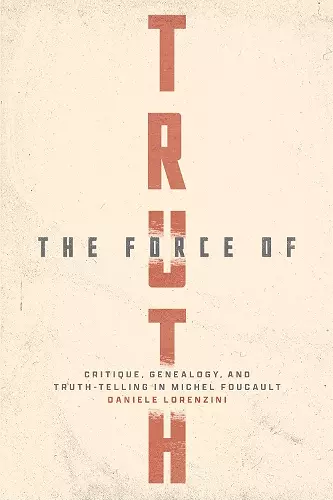The Force of Truth
Critique, Genealogy, and Truth-Telling in Michel Foucault
Daniele Lorenzini author Daniele Lorenzini translator
Format:Hardback
Publisher:The University of Chicago Press
Published:13th Sep '23
£80.00
Supplier delay - available to order, but may take longer than usual.

A groundbreaking examination of Michel Foucault's history of truth.
Many blame Michel Foucault for our post-truth and conspiracy-laden society. In this provocative work, Daniele Lorenzini argues that such criticism fundamentally misunderstands the philosopher’s project. Foucault did not question truth itself but what Lorenzini calls “the force of truth,” or how some truth claims are given the power to govern our conduct while others are not. This interest, Lorenzini shows, drove Foucault to articulate a new ethics and politics of truth-telling precisely in order to evade the threat of relativism. The Force of Truth explores this neglected dimension of Foucault’s project by putting his writings on regimes of truth and parrhesia in conversation with early analytic philosophy and by drawing out the “possibilizing” elements of Foucault’s genealogies that remain vital for practicing critique today.
"A timely intervention into the current debates on post-truth and Foucault’s significance for them. Lorenzini argues, again compellingly, that we need to steer clear of the false dilemma of either conceding that truth is only an effect of power, or strenuously defend the value of absolute truth against fake news and alternative facts. Foucault’s rejection of the Truth—truth understood as timeless and absolute—does not amount to a rejection of truth altogether. Rather, Foucault’s history of truth should be understood precisely as an attempt to criticize the claim that such an understanding of truth is necessary to stop our critical theories and practices from dissolving into relativism." -- Johanna Oksala * Critical Inquiry *
"This fascinating, detailed, and persuasive book . . . turns a new page in debates over Foucault’s fundamental project and its ethical significance, and it is also an excellent introduction to Foucault's more recently published collections of lectures." * Choice *
"Lorenzini has established himself as the most brilliant interpreter of the work of Michel Foucault in his generation. Yet, even beyond this distinction, he has learned, as few people have, to use Foucault's work and perspective to approach topics that Foucault himself never discussed. Moreover, in his extraordinary genealogy of truth, presented in this book, Lorenzini brings together Foucault's writings with those of J. L. Austin and Stanley Cavell, among others, to give us a remarkable new way to think about some of the central issues concerning the idea of truth. Anyone who believes that analytic philosophy and continental philosophy cannot speak to one another can read this book as a superb example of how these two traditions of philosophy can mutually contribute, when read together, to the understanding of fundamental philosophical problems. If Lorenzini is the future of philosophy, philosophy is in excellent hands." -- Arnold I. Davidson, The Hebrew University of Jerusalem
"In this urgent study, Lorenzini offers a powerful corrective to stubborn criticism of Foucault as a postmodern architect of the post-truth age. With stunning command of Foucault’s corpus, Lorenzini reconstructs Foucault’s history of truth as a political epistemology for our troubled times. This extraordinary book reshapes how we should understand—and resist—lying, disinformation, and other forms of political untruth." -- Verena Erlenbusch-Anderson, Syracuse University
"This groundbreaking book refutes the dominant view of Foucault as a relativist and elevates the debate about his notion of truth to a new philosophical level. With exceptional clarity, Lorenzini develops an ethics and politics of truth-telling that is essential reading for everyone who seeks to take responsibility for their claims about the truth—in both theory and practice.” -- Martin Hägglund, Yale University
“In this brilliant and provocative book, Lorenzini upends the conventional way that critics read Foucault as a precursor to our post-truth society. Through a meticulous reading of the Collège de France lectures, Lorenzini masterfully shows how Foucault’s lifelong passion for truth and truth-telling culminates in a powerful theory of truth as a political and ethical practice. A veritable tour de force.” -- Bernard E. Harcourt, Columbia University
ISBN: 9780226827438
Dimensions: 229mm x 152mm x 18mm
Weight: 399g
192 pages